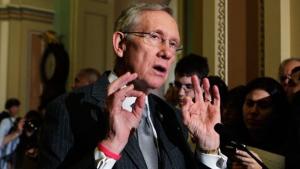Harry Reid’s Silly Ploy to Fight the Hobby Lobby Ruling
Harry Reid’s Silly Ploy to Fight the Hobby Lobby Ruling
More than a week has gone by since the Supreme Court issued its 5-4 decision on Hobby Lobby et al, but the hysterical reaction to it has continued and amplified, especially on Capitol Hill. Backers of the Employment Non-Discrimination Act (ENDA) reversed course this week on their 20-year project, declaring that similar language in that bill to the Religious Freedom Restoration Act (RFRA) meant that passing the bill would signal a wave of discrimination against LGBT workers, an absurd reading of the decisionfueled in large part by media ignorance and political demagoguery.
The National Organization for Women (NOW) created a “Dirty 100” list of organizations objecting to the HHS contraception mandate that included the Little Sisters of the Poor, a charitable organization run by Catholic nuns that handles hospice care for the indigent.
Meanwhile, Senate Majority Leader Harry Reid plans to rebut the Supreme Court by amending the RFRA. Democrats in both chambers of Congress began working on bills that would exempt Obamacare from the bill passed in 1993 and signed by then-President Bill Clinton in an attempt to circumvent the Hobby Lobby decision and force employers to provide free contraception and sterilization to their employees.
Reid announced the effort on Tuesday by announcing that Democrats wouldn’t allow women’s lives to be “determined by virtue of five white men,” which must have come as a shock to Justice Clarence Thomas, one of the five justices to support the majority in the Hobby Lobby decision.
That, however, was just the start of the insanity. Let’s start with a refresher course on the RFRA. Congress passed the RFRA as a response to an earlier Supreme Court ruling in 1993, as I pointed out in last week’s column, when the court upheld a decision that barred unemployment benefits from two Native Americans who smoked peyote in their religious rites (Employment Division v Smith).
The net effect of another Congressional action to carve out a special case for the HHS contraception mandate would have the effect of allowing for peyote use without penalty in those religious rites, but not allowing a much broader population with religious objections to abortifacients and other contraceptive products and services to refrainfrom facilitating their use.
Furthermore, Reid and the Democrats just went the other direction on ENDA in November. The bill, which would have created more specific employment protections for sexual-orientation identities, had been stuck in Congress with little chance of getting a floor vote until Democrats agreed to add protection for free exercise of religion, in order to protect organizations with clear religious missions. LGBT groups hailed the decision at the time, although they reversed course this week based on the exaggerated claims of the same Democrats who agreed to the additional language last year.
Reid and the White House planned to pressure the House into allowing a vote on ENDA with that exemption language, in part to fire up the LGBT lobby and help midterm voter turnout. The effect of this amendment to the RFRA would theoretically provide employers more leeway in hiring decisions than in whether to facilitate the distribution of contraceptives. Plus, it undermines the assurances given on ENDA that Democrats were committed to protecting free religious expression. That will kill ENDA’s chances to get a floor vote in the House for now, and for a long time to come.
The Murray-Durbin-Udall effort to amend the RFRA won’t see the light of day in the House either. The bigger question is whether it will even get a vote in the Senate. Don’t forget that this bill attempts to rescue part of the Affordable Care Act (ACA), better known as Obamacare, which has been widely unpopular since its first proposal five years ago.
It attempts to restore a mandate that actually wasn’t included in the law itself, but was created as a regulation without any vote in Congress. Where the RFRA was a highly popular attempt to protect and expand the ability to defend religious expression – it passed unanimously in the House and 97-3 in the Senate, both controlled at the time by Democrats – the effect of this amendment will be to limit religious expression, which won’t endear Democrats to voters of faith in any sense.
Democratic incumbents in the Senate already face long odds in the upcoming midterm elections, largely because of ObamaCare and the unintended consequences of its rollout and control of the health-insurance market. Reid now wants them to cast a vote to limit religious conscience objections for products that are so widely available that the CDC couldn’t detect any access issues, in what will be seen as another endorsement of the unpopular ACA.
That will come either just before a new round of price hikes gets announced, or at the same time, just weeks ahead of the midterms – price hikes that have the White House so worried that their team has already begun the spin effort to deflect attention. On top of all this, Reid wants them to expose themselves to considerable voter backlash in purple and red states for a bill that has zero chance of becoming law.
Perhaps Harry Reid might convince these vulnerable Senate Democrats to go all in on a futile endorsement of Obamacare, bureaucratic arrogance, and restrictions on religious expression ahead of facing the voters. They may instead think back to what motivated the RFRA twenty-one years ago, and wonder what Harry Reid is smoking.


No comments:
Post a Comment
Thanks for commenting. Your comments are needed for helping to improve the discussion.